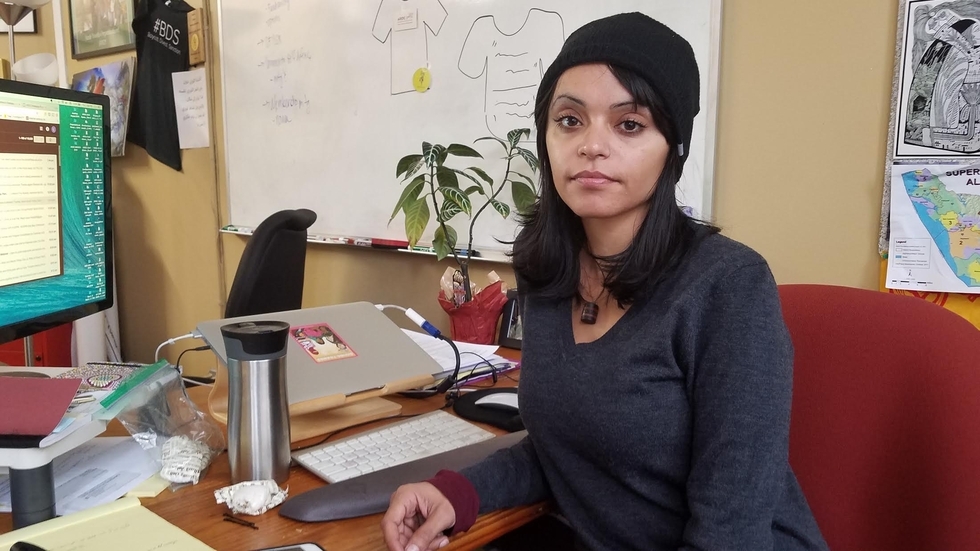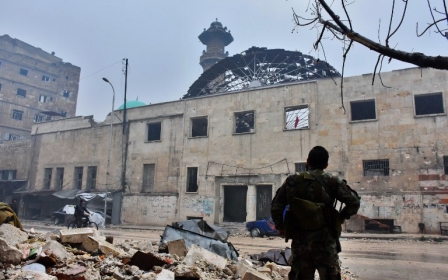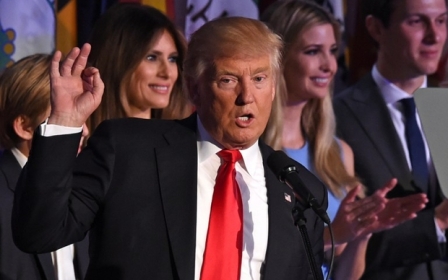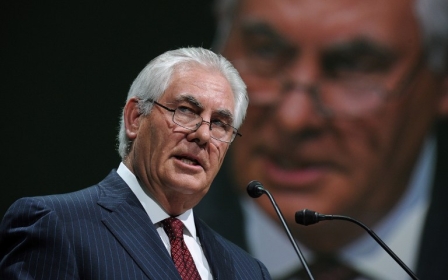Amid Trump's win, San Francisco rights groups fight to keep Arab heritage alive

SAN FRANCISCO, California - As Islamophobia and xenophobia are beginning to show their ugly teeth in San Francisco, Californian activists at the Arab Resource and Organization Center (AROC) are redoubling their efforts to teach local youths about Arab heritage.
Lara Kiswani, AROC's director, is leading a programme linked to keeping San Franciscans aware of Arab culture and language, while engaging youth of Arab descent to learn more about their heritage. A team of six people coordinates dozens of volunteers in the city, many of whom are young people looking to engage with their communities.
“The main campaign we are carrying out in this regard is called TURATH (heritage, in Arabic), mainly through workshops with the San Francisco school districts, to educate teachers on the matter,” said Kiswani.
TURATH stands for Teaching, Understanding and Representing Arabs Through History, and it includes both history and language teaching.
Though the subject is not formally taught as part of the schools' curriculum, educators can include it as part of their classes. AROC can supply them with teaching materials and instruct them on the subject before they incorporate it in lessons.
“Teachers usually reach out to us whenever they feel like there is a gap in education or they have Arab students who may feel left out,” Kiswani explained.
A 2012 report carried out by AROC found that 71 percent of students in public schools in the city had spent “no time” that year learning about Arab people, while 21 percent had only studied about them “for one class”. For non-Arab youths, the report concluded, this lack of knowledge accentuated the racial prejudice directed towards Arabs, Arab culture and Muslims in general.
Part of TURATH's goal is also to engage Arab youth on speaking out in their local communities to fight anti-Muslim sentiments and stereotypes. Many of the Arab youth who are part of TURATH, Kiswani said, organise workshops and give lectures in their schools to teach their peers about their culture.
“We think it's better to reach out to youth through people their own age. We've had Syrian students do presentations about what is going on in Syria, Palestinian students give lectures about Palestine, even Yemeni students talk about what is going on in Yemen right now,” Kiswani added.
The organisation scored big last year when its campaign to expand Arabic language instruction at the city's public schools garnered the support of the San Francisco Unified School District. Beginning in January 2017, any student can ask to receive part of their educational curriculum in Arabic.
“We were elated because there are approximately 800 Arab students in San Francisco that we know of that can now study in Arabic and stay closer to their roots. This will also benefit any student looking to learn a new language,” Kiswani said.
Raising awareness in the Trump era
TURATH's goals have become even more important since last month's elections. AROC, along with other local organisations, reached out to San Francisco's leadership and other Bay Area authorities to ensure that minorities' and immigrants' rights would be protected under Trump's presidency.
According to the organisation, 2016 has seen a stark increase in the number of Islamophobic-related incidents in the city, known worldwide for its tolerance and support of minorities. Although there is no specific data on physical or verbal attacks, AROC says it has received many complaints regarding anti-Muslim aggression compared to 2015.
“We have been working on hate crime-related issues since the days of Bush's special registration for Muslims, so we have a pretty wide legal base and database about Islamophobia and xenophobic-related attacks,” Kiswani said. “But in 2016 and during Trump's campaign, we have definitely seen a hike in the numbers of such attacks, even higher than in 9/11's aftermath.”
The San Francisco Police Department has not released any official numbers regarding hate crimes in the city for 2016. SFPD, however, recently admitted that there has been an uptick of 10 percent of reported incidents compared to last year.
But, according to the Council on American-Islamic Relations (CAIR), that is only the tip of the iceberg.
Sameena Usman, CAIR's government relations coordinator in their Bay Area chapter, told Middle East Eye that they have reported 111 cases of hate crimes against Muslims countrywide in the first 10 days after the elections.
“Those are the number of cases we have investigated, but there are many, many more that are unreported because the community fears some kind of reprisal,” Usman said. “We know that the numbers far exceed 111, but it's extremely difficult to know for sure.”
In the Bay Area, Usman said that in 2016 they have investigated over a dozen cases of hate crimes against Muslims.
“I can't give you an accurate figure because we are still investigating some of them, but I can tell you that, surprisingly, most of them happen at college campuses and schools across the Bay Area,” Usman said.
Local Authorities in the Bay Area admitted that reports about such attacks have spiked since last month. “We have to recognise that hate crimes are tremendously underreported,” San Francisco's District Attorney, George Gascón, told local media recently during a police briefing.
“Given the current environment, there are many people who are fearful of contacting authorities, period. We can’t just simply sit comfortably because perhaps the numbers of these reports aren’t going up as they are elsewhere in the nation and feel that we are immune to this. The fear in the community is real.”
'Given the current environment, there are many people who are fearful of contacting authorities, period'
These reports include verbal attacks on women wearing headscarves and an escalation of violence towards Muslim students in the classrooms, Kiswani told MEE.
“We also can't forget that last year, San Francisco's public buses ran ads with children dressed as terrorists, funded by Pamela Geller, a well-known anti-Muslim personality,” she said.
Protecting minorities
Located in the heavily Latino neighbourhood known as “The Mission”, AROC is not fighting alone. Many other activists and racial and immigration justice organisations have sided with its cause and are in close contact, especially in view of the challenges the upcoming Trump presidency can bring for minorities.
“We work in close cooperation with our partners, to ensure everyone's rights are protected. We're honing in our skills for community self-defence, like 'Know your rights' training and teaching people how to document hate crimes,” Kiswani said.
As a member of the San Francisco Immigrant Legal and Education Network (SFILEN), together with 12 other organisations, AROC is now working to maintain a sense of security among its most vulnerable members - those who are undocumented. After Trump threatened to cancel the sanctuary status of 300 cities across the US, many undocumented migrants of all ethnicities and backgrounds fear deportation.
“The general atmosphere and the national discourse have definitely heightened their fears, while emboldening certain people, even in San Francisco, to parade their xenophobia and Islamophobia. We're trying to curb this, together with SFILEN, through community outreach and providing our community members with the legal tools they need,” Kiswani said.
CAIR is also working with local authorities to reach out to those Muslim community members who feel threatened or have been harassed.
“We have seen an outpour of support from authorities in the Bay Area and in general, the entire community,” Usman said.
“However, we can't deny that Islamophobia was and is latent even in a place as progressive as San Francisco, but it's comforting to know we are not struggling alone.”
Middle East Eye propose une couverture et une analyse indépendantes et incomparables du Moyen-Orient, de l’Afrique du Nord et d’autres régions du monde. Pour en savoir plus sur la reprise de ce contenu et les frais qui s’appliquent, veuillez remplir ce formulaire [en anglais]. Pour en savoir plus sur MEE, cliquez ici [en anglais].




